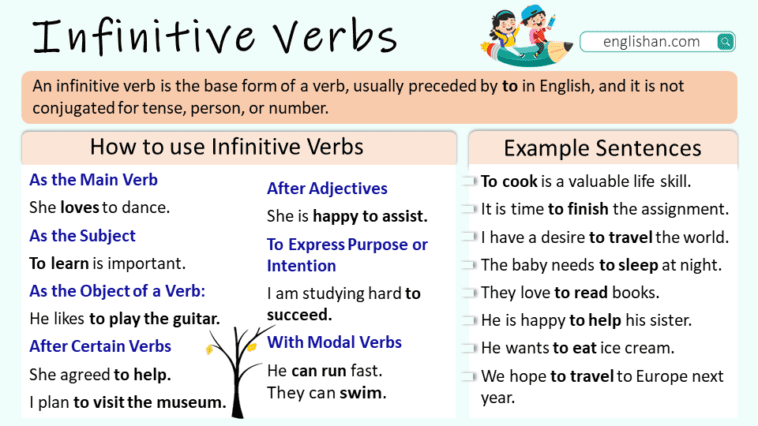Infinitive verbs in English are formed by adding to before a basic verb, like to go or to eat. There are two types: bare (just the verb, like go) and full (with to, like to go). We use bare infinitives after words like can or will (e.g., She can go). Full infinitives come after adjectives or nouns (e.g., “It’s easy to learn or a desire to travel). Infinitive verbs help express purpose, desires, or actions. Knowing how to use them correctly makes speaking and writing in English clearer and more effective.
What is an infinitive verb?
An infinitive verb is a verb form in its base or original state, often preceded by the word “to” in English. It is the most basic form of a verb before it undergoes conjugation or changes based on tense, person, or number. For example, in the infinitive form, to run, to eat, or to write, the base verbs are run, eat, and write. Infinitive verbs are versatile and can function in various roles within a sentence, such as expressing purpose, desires, or actions.
Why are infinitive verbs important?
Infinitive verbs are crucial for clear communication. They serve as the foundational, unconjugated form of a verb, aiding in precise expression of intentions and actions. Understanding them is vital for proper grammar, and their versatility in different sentence roles contributes to effective communication. In essence, infinitive verbs enhance readability by providing a concise and structured way to convey meaning in both written and spoken language.
Key Aspects:
- Basic Form: Fundamental, unconjugated verb form, forming the basis for verb conjugation in different tenses and moods.
- Clarity and Precision: Express intentions and actions with clarity, enhancing communication precision.
- Grammar Foundation: Crucial for understanding English grammar rules, aiding in sentence construction and verb usage.
- Versatility in Expression: Function in various sentence roles—subjects, objects, or complements—adding versatility to language expression.
- Communication Essential: Vital for effective communication in both formal and informal contexts, written and spoken.
- Verb Complementation: Commonly used to complete sentences after certain verbs or adjectives.
- Modal Verb Association: Frequently follows modal verbs, conveying possibility, necessity, or ability.

Infinitive verbs in English grammar
Infinitive verbs in English grammar are the base form of verbs, typically preceded by the word to. The basic structure is to + base form of the verb, as in to go, to eat, or to write. Infinitives serve various functions in sentences and are important for understanding the nuances of English grammar. Here are key points about infinitive verbs:
1. Formation: The infinitive form is created by adding to before the base form of the verb, except in cases of bare infinitives (without to), as seen after modal verbs.
Examples:
- to run, to study, to sing
- She can run. (bare infinitive)
2. Functions: Infinitive verbs can function in different capacities within a sentence:
- Expressing Purpose: I study hard to succeed.
- After Adjectives: It is important to be honest.
- As Subjects: To swim is my favorite activity.
- In Verb Complementation: He wants to eat.
- With Modal Verbs: You should to try.
3. Bare Infinitive: In some cases, the base form of the verb (bare infinitive) is used without to, especially after modal verbs like can, could, will, would, shall, should, may, might, and must.
Examples:
- She can go.
- I will study.
Understanding how to use infinitive verbs correctly is crucial for constructing grammatically sound and clear sentences in English.
Types of Infinitive Verbs
Infinitive verbs in English can be categorized into different types based on their usage and structure. The two main types are the bare infinitive and the full infinitive.
1. Bare Infinitive:
- The base form of a verb used without “to,” often after modal verbs or certain other verbs.
- Example: She can go to the party.
2. Full Infinitive:
- The base form of a verb with the “to” particle, used in various situations, including after adjectives, nouns, and other verbs.
- Example: It is important to study for the exam.
3. Infinitives in Expressing Purpose:
- Used to denote the reason or intention behind an action.
- Example: She studies hard to succeed.
4. Infinitives After Adjectives:
- Follow adjectives to provide additional information.
- Example: It is easy to learn.
5. Infinitives After Nouns:
- Follow nouns to express desires or objectives.
- Example: I have a desire to travel.
6. Infinitives in Verb Complementation:
- Commonly used to complete the meaning of a sentence after certain verbs.
- Example: They decided to leave.
7. Infinitives as Subjects:
- Occur as the subject of a sentence, often emphasizing the action.
- Example: To err is human.
Understanding these types of infinitive verbs enhances language proficiency and facilitates effective communication in English.
Functions of infinitive verbs
Infinitive verbs in English serve various functions within a sentence, making them versatile elements of language. Here are some key functions of infinitive verbs:
- Expressing Purpose:
- Example: She studies hard to succeed.
- After Adjectives:
- Example: It is easy to learn.
- After Nouns:
- Example: I have a desire to travel.
- After Certain Verbs:
- Example: They decided to leave.
- After Modifiers:
- Example: He is old enough to drive.
- As the Subject of a Sentence:
- Example: To err is human.
- In Infinitive Clauses:
- Example: I asked him to help.
- With Certain Phrases:
- Example: She is ready to begin.
- In Split Infinitives:
- Example: It is sometimes acceptable to boldly go where no one has gone before.
- In Verb Complementation:
- Example: She wants to go.
- With Modal Verbs:
- Example: He can to swim. (Note: This is a specific use of the bare infinitive after a modal verb.)
Examples of infinitive verbs in sentences
Here are examples of infinitive verbs used in sentences:
- She hopes to travel to Europe next year.
- It’s important to exercise regularly for good health.
- He decided to learn a new language over the summer.
- We plan to visit the museum this weekend.
- It’s challenging to balance work and personal life.
- She can go to the store after work.
- I must study for the upcoming exam.
- He should eat a healthy breakfast every day.
- It is crucial to understand the assignment before starting.
- She decided to travel to Europe during the summer.
- I want to learn how to play the guitar.
- She works hard to achieve her goals.
- He studies diligently to graduate with honors.
- They saved money to buy a new car.
- It is important to be honest in all situations.
- She is excited to start her new job.
- The movie was too boring to watch until the end.
- I have a desire to travel the world.
- His goal is to become a successful entrepreneur.
- The decision to resign surprised everyone.
- They agreed to help with the project.
- I plan to visit my grandparents next weekend.
- It is time to finish the assignment.
- To swim is my favorite summer activity.
- To write requires creativity and discipline.
- To cook is a valuable life skill.
How to Use Infinitive Verbs
Using infinitive verbs correctly involves understanding their various functions and roles in a sentence. Here are some guidelines on how to use infinitive verbs:
1. Base Form:
- Use the base form of a verb, often with to.
- Example: She likes to dance.
2. After Modals:
- Use the bare infinitive after modal verbs (e.g., can, will).
- Example: They can swim.
3. After Certain Verbs:
- Follow verbs like want or decide with the infinitive.
- Example: She decided to study abroad.
4. After Adjectives:
- Use the infinitive after adjectives.
- Example: It’s important to be honest.
5. As Subjects or Objects:
- Infinitives can serve as subjects or objects.
- Example (subject): To learn is essential.
- Example (object): She loves to read books.
6. Expressing Purpose:
- Use infinitives to show the purpose of an action.
- Example: He studies hard to succeed.
7. Verb Complementation:
- Complete sentences with infinitives after certain verbs.
- Example: They agreed to help.
8. With Certain Phrases:
- Pair infinitives with phrases like it’s time or it’s important.
- Example: It’s time to go home.
9. Split Infinitives:
- Occasionally, adverbs can be placed between to and the verb.
- Example: She decided to boldly go where no one had gone before.
By following these simple rules, you can use infinitive verbs effectively in English.
List of Infinitive Verbs
Infinitive verbs are the base form of verbs, often preceded by to. Here’s a list of common infinitive verbs:
- to be
- to have
- to do
- to go
- to eat
- to sleep
- to study
- to learn
- to work
- to play
- to write
- to read
- to speak
- to listen
- to run
- to walk
- to swim
- to dance
- to sing
- to cook
- to travel
- to think
- to understand
- to help
- to love
Quiz:
Here’s a quiz to test your understanding of infinitive verbs. Choose the correct option for each sentence.
- She decided __________ to the party. a. going b. to go
- It is crucial __________ a good impression. a. making b. to make
- I want __________ fluent in Spanish. a. being b. to be
- He can __________ the guitar. a. playing b. to play
- It’s time __________ your homework. a. doing b. to do
- The goal is __________ a healthier lifestyle. a. adopting b. to adopt
- She is excited __________ a new project. a. starting b. to start
- They agreed __________ with the plan. a. helping b. to help
- It’s necessary __________ the rules. a. understanding b. to understand
- I enjoy __________ to music. a. listening b. to listen
- It’s a good idea __________ early. a. rising b. to rise
- The first step is __________ the instructions. a. reading b. to read
- They plan __________ a vacation next month. a. taking b. to take
- We need __________ the problem. a. solving b. to solve
- She dreams __________ a successful business. a. starting b. to start
Answers:
- b. to go
- b. to make
- b. to be
- b. to play
- b. to do
- b. to adopt
- b. to start
- b. to help
- b. to understand
- a. listening
- b. to rise
- b. to read
- b. to take
- b. to solve
- b. to start



